The Hacktivists – study guide - FRAW
The Hacktivists – study guide - FRAW
The Hacktivists – study guide - FRAW
Create successful ePaper yourself
Turn your PDF publications into a flip-book with our unique Google optimized e-Paper software.
(52 mins, 2000)DOCUMENTARY WRITER/DIRECTOR: Ian Walker. Ian has been making documentary films since 1993 on topics such as social issues, gender politics, art and anarchy.PRODUCERS: Chris Hilton, Peter Day, Laurent Boucaut. A Hilton Cordell (Australia) /Dominant 7 (France) co-production. Australian Film Finance Corporation & Arte FranceWARNING: <strong>The</strong>re is occasional coarse language used in the film.SUITABLE FOR: upper secondary and tertiary students, community groups or professional training, non-government organisations. Relevant to Studies of Society and theEnvironment, English, Media Studies, Computing, Information Technology, Politics, Modern History, Law, Justice Studies, Indigenous Studies, Business Management.INFORMATION WARTHE HACKTIVISTSPATRICIA KELLYSTUDYGUIDEhISSUE 29 AUSTRALIAN SCREEN EDUCATION1
tLAPTOPS TO THE FRONTLINE: Nart Villeneuve BRAVES THE TEARGAS ON THE STREETS OF QUEBEC TO CHAT ON-LINE TO FELLOW‘HACKTIVISTS’ ON THE OTHER SIDE OF THE PLANET [ABOVE]ISSUE 29 AUSTRALIAN SCREEN EDUCATION2SYNOPSISTHE HACKTIVISTS IS A ONE HOUR DOCUMEN-TARY THAT EXPLORES THE WORLD OF ON-LINEACTIVISTS. THESE ARE COMPUTER EXPERTS WHOARE USING THE INTERNET AND CYBERSPACEAS VERY EFFECTIVE, NEW MEANS OF PROTESTAGAINST GLOBAL CAPITALISM AND THE POWEROF LARGE TRANSNATIONAL COMPANIES. WE MEETFOUR MAIN CHARACTERS: NART VILLENEUVE, ACANADIAN, RENAUD COURVOISIER, A FRENCH-MAN, PAUL MOBBS FROM THE UK AND RICARDODOMINGUEZ FROM THE USA. EACH HAS DIFFER-ENT SKILLS AND WAYS OF OPERATING BUT THEINTERNET ALLOWS THEM TO POOL THEIR TALENTSAND WORK COLLABORATIVELY ON-LINE TO CHAL-LENGE GOVERNMENTSAND CORPORATIONS.DEPENDING ON YOURPOINT OF VIEW, YOUMAY SEE THEM AS‘INTERNET WARRIORS’TRYING TO SAVE THEWORLD, AS ‘CYBER-TERRORISTS’ OUT TO BREAK THE LAW, OR ASFOOLISH ‘GEEKBOYS’ CAUSING DIGITAL MISCHIEFFROM THE SAFETY OF THEIR HOMES.<strong>The</strong> documentary also looks at theiropponents in what the documentarycalls an ‘information war’. <strong>The</strong> growthin web-based activism has also createdan industry devoted to opposing them.‘Cybersleuths’ such as Ben Venzkemake a lot of money by protectingcompanies from cyber attack, scouringthe web for evidence of intendedaction. It raises questions as to whatkind of globalisation we want, whatdemocracy means in a digital age andwhat power and responsibilities wehave as citizens in this time of rapidchange.<strong>The</strong> <strong>Hacktivists</strong> is the first of aplanned trilogy of films about <strong>The</strong>Information War. <strong>The</strong> second will be<strong>The</strong> Dreamweavers, looking at thetactics of corporate advertising andtheir battle for consumers’ attentionand the third will be <strong>The</strong> CultureJammers, examining the artists whouse their art skills to try to keep themedia honest by re-arranging mediamessages and reflecting them back tothose who make them.
PRECEDING PAGE: IAN WALKER, PART-TIME ANARCHIST & DIRECTOR OF THE HACTIVISTS. BOTTOM: CYBERSLEUTH BEN VENZKE:‘Now you can sit halfway around the world and shut down a company’s ability to operate on the other side of the worldby clicking a couple of buttons’. Clockwise top left this page: ‘Fences mean nothing to us’. So say the protagonists inthe documentary <strong>The</strong> <strong>Hacktivists</strong> who scared the Quebec police into shutting their website during the Summit of theAmericas protest for fear of cyber attack; DIGITAL ZAPATISTA: ‘WORDS AS WAR, NOT WORDS FOR WAR’. SO SAYS RICARDODOMINGUEZ, ONE OF THE ON-LINE AGITATORS ‘UNMASKED’ IN THE HACKTIVISTS.BEFORE WATCHING THEVIDEOEstablish viewer understanding andawareness of the many key terms andjargon used. Here is a starting list:activist, hacker, hacktivist, culturalsubversion, digital age, capitalist, anticapitalist,globalisation, anarchism,virtual, on-line, off-line, avatar, cyberterrorist, evangelist, geekboy, digitalmischief, cybersleuth, tear gas, sit-in,civil disobedience, Mahatma Gandhi,Martin Luther King, Zapatista, mobilise,multinational, transnational, spam,trilogy, free trade, WTO, World Bank,FTAA.Establishing this knowledge isparticularly helpful for students forwhom English is a second or additionallanguage and equally useful toestablish what all students alreadyknow about the topic and where theirknowledge strengths and gaps are.TOPICS FOR DISCUSSIONHere are some topics for discussionto help you to begin your work in thiscomplex and growing area.1 FILM-MAKINGA) THE ‘WAR’ METAPHOR• Identify some different uses of warimagery in the documentary. Whatare some possible effects on viewersof using this kind of language?• Can you think of a different metaphorfor this issue? How woulda different metaphor change themood of the film itself?• Compare this language with thatused in newspaper reports of antiglobalisationdemonstrations orevents.B) THE OPENING SCENES• We see a quote from Marshall Mcluhan,‘World War III will be a guerillainformation war, with no divisionbetween military and civilian participation’.This quote appears onscreen and is then deleted as itwould be on a computer screen,word by word. What purpose couldthis visual device serve in termsof effects on the viewer? What didMcluhan mean? Do you think he iscorrect in his prediction?C) THE CLOSING SCENES• <strong>The</strong> film uses a split screen to showthe forces on both sides of a protestin Canada, the Quebec police andthe protesters. Describe what yousee. What are the benefits for afilm-maker in using a split screen?How effective do you think it is inthis context?D) THE MUSIC• Listen to the music in the openingscenes, without the vision. Whatimages does it create in your mind?How well do they match and supportthe accompanying visual images?How important is the role ofmusic in documentaries?2 RESPONSIBILITY• Find out about the ‘Battle ofSeattle’. <strong>The</strong>re were 50,000 peopleprotesting on the streets in thismass anti-globalisation protest but400,000 involved in on-line protests.Groups like Electrohippies engagein virtual sit-ins, where they informparticipants how to jam a web siteso that they can prevent it doingany business on-line. Paul Mobbssays, ‘Electrohippies don’t tell themISSUE 29 AUSTRALIAN SCREEN EDUCATION3
tRICARDO DOMINGUEZ FROM THE ELECTRONIC DISTURBANCETHEATRE: ‘ELECTRONIC CIVIL DISOBED-IENCE IS NON VIOLENT, DIRECTACTION ONLINE’. [ABOVE]ISSUE 29 AUSTRALIAN SCREEN EDUCATION4what to say, we just provide themechanism whereby they can saysomething’.• What ethical, moral or legal issuesare involved in planning or participatingin this kind of protest?3 THE ROLE OF MASKS• <strong>The</strong> hacktivists and real world protestersoften wear masks or facescarves. Discuss the history andpurposes of masks in cultures thatyou are familiar with. What are someof the roles masks play in culturallife around the world?• What is an ‘avatar’ on the Internet?What avatar would you choose?• Discuss the possible benefits anddisadvantages of using avatars inInternet communications.ACTIVITY• Experiment with everyone wearinga mask for a lesson or a period oftime. What effect does this haveon you as the wearer? What effectdoes it have on the way othersrelate to you?4 POSSIBLE FUTURES• Read some of the many novels andshort stories depicting alternativefutures for our civilisation. <strong>The</strong>semay be ‘utopias’, depictions of idealsocieties or ‘dystopias’, depictionsof societies in crisis. e.g. 1984,Animal Farm, Brave New World,Blade Runner and Gattaca. Someare available in both book and filmversions.• Identify common features of eachof these kinds of futures. What areyour own utopian and dystopianvisions for Australia?5 CYBERSLEUTHS• Ben’s website states, ‘<strong>The</strong>y’re outthere. You can’t see them. <strong>The</strong>y’lltake you down’. His slogan is‘Intelligence is the best defence’.• <strong>The</strong> hacktivists say they can attacktheir larger adversary from alldirections. This is like the ‘warof the flea’ which the Vietcongused so effectively against theUSA in the 1960s and 1970s andthe Afghanistanis used againstthe Soviet Union in the 1980s.What other people can you identifyas using similar tactics in thisdecade?• Who is the ‘they’ in Ben’s statements?What effect is this choice ofwords designed to have on Ben’spotential clients?• What are the obvious differencesand similarities between Ben’s wayof life and those of the <strong>Hacktivists</strong>?How do you explain the differences?6 GLOBALISATION• Ask students to brainstorm themeaning of ‘globalisation’. <strong>The</strong>re aremany defi nitions of globalisation.It may be defi ned as ‘the fl ow oftechnology, economy, knowledge,people, values, ideas … acrossborders’. (Knight, 1996). It alsobenefits some people anddisadvantages others. In 1996,James Speth, the Administrator
CLOCKWISE FROM TOP LEFT: Babar the Elephant…the internet alterego of French hacktivist Renaud Courvoisier fromthe Federation of Random Action; THE POLITICS OF CODE: THE SYMBOLISM OF ELECTRONIC PROTEST AS DISPLAYED BY RICARDODOMINGUEZ’ STREET PERFORMANCE, WRITING OUT THE CODE TO HIS INFLUENTIAL ‘FLOODNET’ TOOL; Canadian hacktivist NARTVILLENEUVE: ‘We’re not against globalisation, we’re against how it’s happening, and who’s in control of how it’shappening’.of the UN Development Program,gave alarming statistics aboutdeclining standards of living inmany countries. He warned, ‘Ifpresent trends continue, the definingconcerns of international affairsin the next century will revolvearound the struggle for equity—equity among nations, equity withinnations, between the sexes andfor future generations’. <strong>The</strong>setrends were recently up-datedby Dr Selim Jahan, the DeputyDirector of the United NationsHuman Development Program. Atthe Australian launch of the 1998report, he stated that twenty six percent of the world’s people accountfor eighty six per cent of spendingfor personal consumption. <strong>The</strong>wealthiest twenty per cent consumeforty five per cent of meat and fish,use fifty eight per cent of totalenergy, own seventy four per centof all telephone lines and eighty percent of the world’s vehicles (Ellicott,1998, p.3).• Compare and contrast various definitionsof globalisation with thatgiven by Renaud, ‘Everyone to joinin and voice their concerns. Resistanceis global, activism is global,hacktivism is global’.• Ben likens the Internet to the city.Amazon.com represents the richof the world while the <strong>Hacktivists</strong>represent groups he lists as ‘... thepoor, organised crime, etc’. Do youagree with his description?• Renaud talks about his work asdevoted to ‘politics in its noblestsense’ rather than ‘politicking’.What do you think he means bythis? He gives an example of asuccessful action inearly 2000 in whichhacktivists targeteda company calledFidelity Investments.After five days ofprotest the companydivested itself oftwenty five per cent investment ina large petroleum company. <strong>The</strong>action was taken to protect theinterests of an Indigenous groupwhose land was under threat fromthe company’s oil exploration.• How many points of view are involvedin this particular issue?7 THE LAW• International law has not keptpace with globalisation, but underAmerican law, Renaud would beliable for the company’s costs in reestablishingfive web sites, involvingfines of $5000 or a year’s jail.• What information would aresponsible web site give topotential protesters so that theyknow what they are agreeing todo when they take part in a webprotest?ACTIVITY• Devise a quick and easy tounderstand checklist for any studentwho might be interested in onlineactivity, so they can assess anactivist web site they may intendusing for reliability of informationand for responsibility towards thosewho want to use it.8 DEMOCRACYProfessor John Arquilla, a US Defenceanalyst argues: ‘<strong>The</strong> notion of freedomof movement in cyberspace is very5ISSUE 29 AUSTRALIAN SCREEN EDUCATION
tTHE FRENCH CONNECTION: THE FBI WERE ON THE TRAIL OFMARSEILLES HACKTIVIST RE:NO AFTER A FIVE-DAY CYBER ACTIONWHICH DISRUPTED THE WEB SITES OF FINANCE MULTINATIONALFIDELITY INVESTMENTS. [ABOVE]closely related to physical movement.Why in the world would we want tocreate a fence around a meeting inwhich the future of two continentswas being decided? If indeed we aregoing to leave no-one behind, whywould we shut people out?’ He says,‘<strong>The</strong> more they (the government andcorporations) succeed (in shuttingpeople out), the more they lose’.ACTIVITYOne of the cyber campaigns had theslogan, ‘<strong>The</strong> mouse is mightier thanthe baton’.• Organise a debate on this topic. <strong>The</strong>teams could choose to take on thepersonae of some of the activistsseen in the video.Prepare a profile on each of themain characters you see in thedocumentary, on the lines of thosein the computer game, Where in theWorld is Carmen Miranda?Below is a proforma to help you.Teachers could use these to preparea sheet for students to use while theywatch the video.ISSUE 29 AUSTRALIAN SCREEN EDUCATION6What does he mean by this criticismof harsh government or corporateresponses to hacktivism?CIVIL DISOBEDIENCE• Ricardo says, ‘Electronic civildisobedience is non-violent directaction on-line’. He puts this in thehistorical context of other actsof civil disobedience in line withthe thinking of Gandhi and MartinLuther King. How did these activistsuse civil disobedience within theirsocieties? How successful werethese campaigns in bringing aboutchange?Where do actions such as those of therefugees detained at Woomera andother detention camps in Australia,and the actions of their Australiansupporters, fit into the concept of civildisobedience?ACTIVITY• Use print and web-based materialsto identify a variety of points of viewon this controversial issue in theAustralian community today.OTHER ACTIVITIES1 HACKTIVIST PROFILES[Please note that these profiles reflectthe <strong>study</strong> <strong>guide</strong> writer’s choice ofcomments. You may wish to choosedifferent quotes for the profi les youprepare.]PROFILE 1NAME: Nart VilleneuveUSERNAME: metacomURL: thehacktivist.comLOCATED: CanadaAIM: laptops to the frontline.MISSION: to bring Internet protest and‘real world’ activism closer together.DESCRIPTION:MOTIVATION AS REVEALED BY THE
CLOCKWISE FROM TOP LEFT: CYBER PROTEST IN ACTION…<strong>The</strong> Electrohippies do it from Wales, ‘pinging’ websitesassociated with the Summit of the Americas meeting in Quebec; ELECTROHIPPY PAUL MOBBS: ‘WE’RE JUST DEVELOPINGTHE SYSTEM WHEREBY PEOPLE CAN EXPRESS. ELECTROHIPPIES DON’T TELL THEM WHAT TO SAY, WE JUST PROVIDE THEMECHANISM WHEREBY THEY CAN SAY SOMETHING’.DOCUMENTARY AND WEB SITE.MODUS OPERANDI:KEY INCIDENTS:PROFILE 2NAME: Ricardo DominguezNAME: Carmin Karasic (the only femalehacktivist featured)USERNAME: rdomGROUP: Electronic Disturbance <strong>The</strong>atreLOCATION: New York CityAIM: electronic civil disobediencethrough software tools. Carmin says,‘It’s a performance that mobilisesthousands of people at a global level,therefore it’s also a threat to any government.Any government is goingto get upset if somebody other thanthem knows how to mobilise largemasses of people’.MISSION: to support Mexico’sZapatista rebels, the firstrevolutionary group to go on-line.DESCRIPTIONS:MOTIVATION AS REVEALED BY THEDOCUMENTARY AND THEIR WEB SITE:MODUS OPERANDI:KEY INCIDENTS/NOTEWORTHY SCENES:PROFILE 3GROUP: Federation of Random ActionLOCATION: Marseilles, FranceAIM: making electronic protest fun.MISSION: ‘ ... to create through the Internet,at a world wide level, throughexchanges of thoughts, different cultures,a different way of looking atpolitics, not politicking, but politics inits most noble sense’.DESCRIPTION:MOTIVATION AS REVEALED BY THEDOCUMENTARY AND HIS WEB SITE:MODUS OPERANDI:KEY INCIDENTS/NOTEWORTHY SCENES:PROFILE 4NAME: Paul MobbsUSERNAME: djnzGROUP: the Electrohippies CollectiveLOCATION: United Kingdom (Wales)AIM: pc liberation evangelistMISSION: ‘... to explain what computer-basedactivism is all about, andshow it is relevant to people’s everydaylives’.DESCRIPTION:MOTIVATION AS REVEALED BY THEDOCUMENTARY AND HIS WEB SITE:MODUS OPERANDI:KEY SCENES/NOTEWORTHY INCIDENTS:NAME: Ben Venzke, cybersleuthLOCATION:AIM:MISSION: ‘To understand who thesepeople are, what they are capable of,what drives them in order to accesswhat kind of a risk they pose to ourclients, and in doing that you begin todevelop an understanding of kind ofwho they are’.DESCRIPTION:MOTIVATION AS REVEALED BY THEDOCUMENTARY AND HIS WEB SITE:MODUS OPERANDI:KEY SCENES/NOTEWORTHY INCIDENTS:PROFILE 6NAME: Jesse HirschLOCATION: USAAIM: breaking into company websitesas ‘inconvenience leads to education’.MISSION: students and workersagainst capitalism.DESCRIPTION:MOTIVATION AS REVEALED BY THEDOCUMENTARY AND HIS WEB SITE:MODUS OPERANDI:KEY SCENES/NOTEWORTHY INCIDENTS:FOR EACH PROFILEISSUE 29 AUSTRALIAN SCREEN EDUCATIONNAME: Renaud CourvoisierUSERNAME: Re:noPROFILE 5Add the following activities.7
tPC LIBERATION EVANGELIST PAUL MOBBS FROM THE DIGITALMISCHIEF-MAKING GROUP ELECTROHIPPIES. [ABOVE]ISSUE 29 AUSTRALIAN SCREEN EDUCATION8• Using all this information, write yourown assessment of this person andhis actions.• Compare it with another person’sprofile.• Make a brief oral report on yourfindings.ACTIVITY 2• Prepare an adapted profile for thefilm-maker. Ian Walker is an awardwinningwriter/director who ‘hasdedicated his film career to makingthe “ordinary” extraordinary’, agenre he describes as ‘magic realist’documentary.• What is his aim in producing thisfilm as you understand it from thedocumentary?• Could you analyse and/or critique hispoint of view in this documentary?• What would you do differently if youwere the film-maker?OTHER RESOURCESWEB SITESA search using the term <strong>Hacktivists</strong>brings thousands of sites, most ofwhich include links to Hacktivist sitesand to those of their critics so thatstudents can compare the arguments.Here is a sample.DEFINITIONShttp://www.cafedigital.com/social/hacktivists.shtmlThis web site offers a useful one pagedescription of the terms hacker andhacktivist. Hackers ‘… usually limittheir criticism of the military-industrialworld to its imperfect security. Most oftheir activity is restricted to pointlessvandalism and swiping the occasionalcredit card number. For hackers, theidea has been the challenge of thehack, not necessarily the messagebehind it’.Compare this with hacktivists. ‘<strong>The</strong>message is everything for politicalactivists. <strong>The</strong>y’re usually motivated bythe need for social change and they’vepaid little attention to the informationtechnology. Traditionally, they hold sitinsor marches to get their messageacross’.Some examples of hacktivism fromthis site include Animal Liberationistsand also Portuguese hackers, whoused their skills to highlight Indonesianhuman rights abuses in the formerPortuguese colony, East Timor, inSeptember 1998.• This site contains more detail aboutthe Electronic Disturbance <strong>The</strong>atrefeatured in this video and their webtool called FloodNet.HACKTIVISTShttp://news.bbc.co.uk/hi/english/world/americas/newsid_1614000/1614927.stmThis is an interesting story about theway that young Muslim hacktivists arepromoting their views on the web andthe response from the USA. Anothersimilar site is http://news.zdnet.co.uk/story/0,,s2082450,00.htmlhttp://www.cnn.com/TECH/computing/9910/08/pakistani.hack/This site contains a critical view ofhacktivism and contains links to other
CLOCKWISE FROM TOP LEFT: <strong>The</strong> bizaare Zurich-based art group etoy.com…surrealist businesspeople responsible forhacktivism’s finest moment so far, the legendary Toywar of 1999; INCREASINGLY, FACED WITH THOUSANDS OF RIOT POLICEAND EVER STRONGER FENCES TO KEEP THEM OUT, ANTI-GLOBALISATION PROTESTERS MAY HAVE NO OPTION BUT TO GO ‘ELECTRONIC’;clockwise top left: Hacktivism unmasked…Nart Villeneuve (Canada), Renaud Corvoisier (France), Ricardo Dominguez(United States) & Paul Mobbs (UK) … working across four continents towards a single day of cyber protest againstglobalisation.sites that refer to ‘Cyber War’. Accordingto Alex Fowler, Strategic InitiativesDirector for the Electronic FrontierFoundation, ‘Taking responsibility isnot something we see happening. Oneof the critical things in environmentalcauses and the civil rights movementwas that groups who used strongtactics and intentionally broke thelaw eventually came forward and tookresponsibility for their actions. It wasowning up that really helped thesemovements forward’.CYBERSLEUTHS AND CIVILRIGHTShttp://www.guardian.co.uk/internetnews/story/0,7369,416954,00.htmlthe Internet with software calledCarnivore. This would allow them totrawl for emails containing particularwords’. <strong>The</strong>se actions have civil rightsimplications that you may wish todiscuss and explore further.THE BATTLE OF SEATTLEHere is one of numeroussites about this large antiglobalisationprotest inthe USA. It also has linksto many others, includingUS government sites, toprovide official versionsof what happened as wellas the versions of thosewho protested.Electrohippies Collectivehttp://www.fraw.org.uk/ehippies/etoy corporationhttp://www.etoy.com/Defense, Ben’s former employerhttp://www.idefense.com/This is another useful site with astory that could be used as the basisfor discussion or activities. It hasexcellent defi nitions and includes acritical discussion of the motivationof the hacktivists as well as some ofthe measures that governments arebeginning to take against them. Forexample, ‘In Britain, the Regulationof Investigatory Powers Act has giventhe police and security services thepower to collect Internet data withouta warrant and to demand the keysto encrypted material. In the UnitedStates, the FBI is seeking the rightto capture all messages sent acrosshttp://past.thenation.com/cgi-bin/framizer.cgi?url=http://past.thenation.com/issue/991227/1227greider.shtmlUSEFUL WEB SITES<strong>The</strong> Hacktivist online magazinehttp://www.thehacktivist.com/Electronic Disturbance <strong>The</strong>atrehttp://www.thing.net/~rdom/Federation of Random Actionhttp://this.is/etoytech/fra/REFERENCESEllicott, J., ‘Gadgets leave us poorer’,<strong>The</strong> Courier Mail, Brisbane, Queensland,10 September 1998, p.3.Knight, J., Internationalization: Elementsand Checkpoints, CBIE, Ottawa,1994.Speth, J., ‘Economic Growth andEquitable Human Development’, thelaunch of the 1996 Human DevelopmentReport, UNDP, 16 July 1996.ISSUE 29 AUSTRALIAN SCREEN EDUCATION9


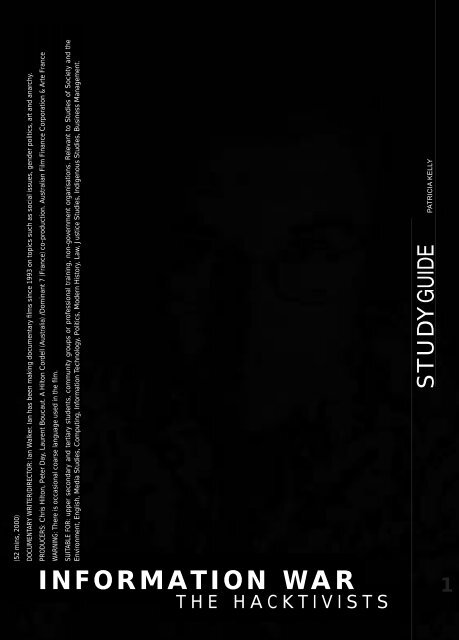
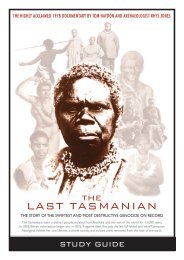
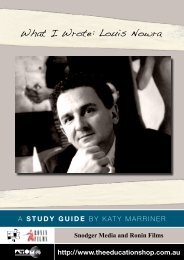


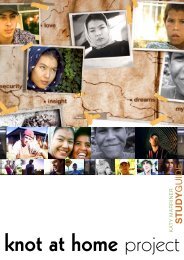


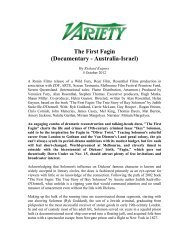
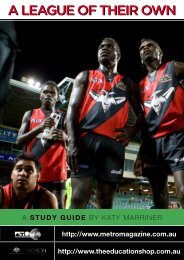
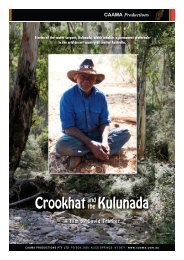
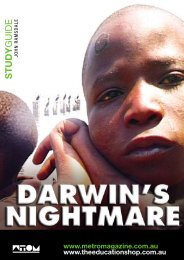
![to download FROHE OSTERN! [HAPPY EASTER!] - Ronin Films](https://img.yumpu.com/33740736/1/184x260/to-download-frohe-ostern-happy-easter-ronin-films.jpg?quality=85)

